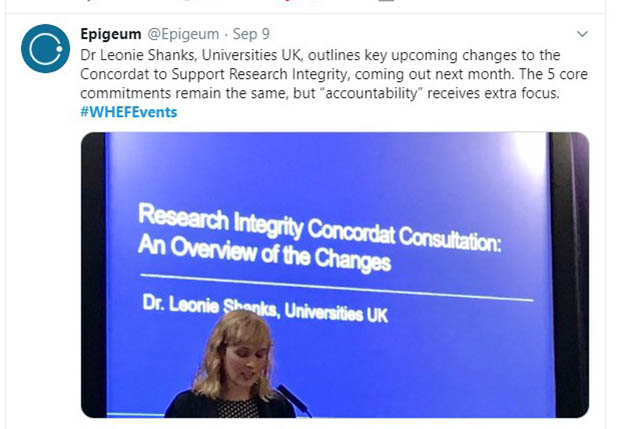13 Sep 2019
‘Integrity distinguishes research from fiction’ stated Dr Thomas Kitching, Chief Scientific Advisor’s Emerging Tech Attaché, in his opening remark at Westminster Higher Education Forum’s ‘Next steps for protecting research integrity in the UK’.
Rebecca Aris
Research integrity means conducting research in a way that allows others to have trust and confidence in our methods and findings. It protects us from fraud and misconduct and helps us to avoid mistakes caused by avoidable errors, whilst enhancing good practice.
However, a report on research integrity last year identified serious problems in this space, as was highlighted by James Parry, Chief Executive, UK Research Integrity Office. But where, he asked, should we be going? In order to improve the research culture, we need to spread the message that good research integrity is for the benefit of everyone, he advised, and we also need to define what research integrity is, and what it isn’t.
This thought was echoed by Dr Beth Thompson, Head of UK & EU Policy, Wellcome Trust: ‘We need to create a collective vision of what really great research culture looks like’, she said ‘then break it down into achievable goals’.
Dr Thompson identified the ‘publish or perish’ culture in academia, whereby researchers are under pressure to rapidly and continually publish academic work to sustain their career, as a key factor in impeding good research culture.
‘The publish or perish culture, is ingrained from the start of researchers’ careers’, added Dr Claire Cope, Policy Manager, The Academy of Medical Sciences, ‘with a push towards high-impact journals.’ The solution, identified by Dr Cope, was a focus on training on best practice in this space at all career stages.
‘As a community, we’ve failed to self-regulate’, said Dr Tanita Casci, Head of Research Policy, University of Glasgow, adding that she was awaiting the utopian vision of research culture.
Professor Andrew George, Non-Executive Director and Chair, Research Transparency Expert Group shared his vision of utopian as a world where ‘we can trust the information publicly available to us for the benefit of all.’ His advice on how to achieve this was in three clear steps – to make transparency easy, make compliance clear and to make information public.
The revised concordat to support research integrity, published by Universities UK, is due out in October 2019. The document has been produced provide ‘a comprehensive national framework for good research conduct and its governance.’ This revision will ensure that compliance could be more easily assessed, and it will clarify expectations of researchers, funders of research and employers of researchers and will hopefully provide a stepping stone towards the vision of an improved research culture.
After all, ‘UK research is world leading’, as Stephen Metcalfe MP, Science and Technology Select Committee, pointed out, so ‘we need to also lead in integrity.’

